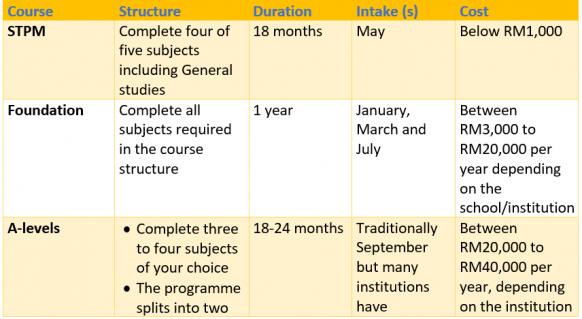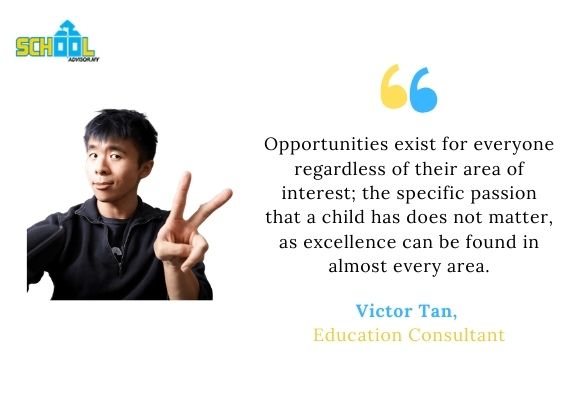Want to know more about your options after secondary school?
Read these articles to gain better understanding on the types of Pre-University education offered in Malaysia.

Pre-University Programmes at School Level




American degree
Since currently there are no American branch universities in Malaysia, taking an undergraduate degree fully in Malaysia is not viable
American Degree Programme (ADP) is the recommended pre-university programme if you are interested in getting an American degree. ADP is the direct route towards an undergraduate degree after O-level or SPM.
British degree
There are multiple options to get a British degree, branch campuses, British degree programmes at Malaysian colleges, or even twinning programmes.
Almost every secondary student is viable to enter a British curriculum university, A-level, STPM, or foundation. However, colleges with pre-university programmes are recommended to avoid taking additional tests, such as IELTS.
Australian degree
There are multiple options to get a Australian degree, branch campuses, Australian degree programmes at Malaysian colleges, or even twinning programmes.
Almost every secondary student is viable to enter an Australian curriculum university, A-level, STPM, or foundation. However, colleges with pre-university programmes are recommended to avoid taking additional tests, such as IELTS.
Choosing pre-university programmes can be challenging due to the vast range of options. Numerous factors affect the decision, such as the desired degree and prior education. Here are the most common options:
International Baccalaureate Diploma Programme (IBDP): The IBDP is a pre-university programme originating from Switzerland and considered a Year 12 qualification. In order to undertake this two-year programme, an SPM qualification or equivalent is required
A-Levels: The A-Level is offered by private institutions and is considered to be equivalent to Form 6 in the UK. There are two streams available, Science and Art.
Australian Matriculation (SAM/AUSMAT): This is an Australian-based qualification which can be pursued right after SPM/Year 11. This programme is 10-12 months long.
Canadian Pre-University (CPU): This is a Year 12 qualification delivered according to the requirements of the Ontario Ministry of Education in Canada. Graduates will earn the Ontario Secondary School Diploma (OSSD) which is globally accepted as an entry into universities upon completion.
American Degree Programme (ADP):The ADP is a direct entry into university level after SPM or O-Level. Enrolling into ADP would mean that you are already pursuing your degree. ADP has a credit-transfer option if you choose to finish your degree in USA
A gap year is when students take a window of time before entering college or university to engage with educational or developmental activities, such as internships.
Taking a gap year is not a common practice in South East Asian countries. The prejudice towards gap year is that it is a waste of time. Parents usually prefer if their child finishes their academic education as early as possible. However, there are cases when a degree becomes invaluable without work experience in the employment process.
Gap year can be utilised by students to look for part-time jobs or internships that can improve the quality of their resume. It provides an experiential learning that can improve their performance on the field.
Those who choose to take a gap year may also opt to travel or volunteer in their areas of interest. The most important thing for young people to do with their time off is to gain any kind of exposure to get a taste of the world outside of a school or academic setting. Travelling in general will also open up their minds about their future possibilities.
Studies have shown that a gap year can help young adults discover their interests through volunteering or travelling, perform better in university and even heighten appreciation of the value of their education.
Let your child take a gap year to let them figure themselves out away from an academic setting. School activities take up a lot of time, leaving children with very little time to work on their own projects or interests. By taking a gap year, it allows children to explore careers that they are interested in through internships or workplace visits.
Consulting with an education advisor can assist your child to explore and browse available options. Often enough, their dream universities or career is at the back of their mind but they can not figure it out. Exposing them to the available options can help them figure out their goals.
You can also check with the education advisor if there are certain resources or tests your child can undergo to help determine their strengths. There are junior versions of tests such as StrengthFinder that may help them discover uncovered or latent skills.
Encouraging them to talk to the people in their field of interest may also help them understand it better. It may be tempting to do this for them, but it’s always best to get them to do it for maximised impact.
This depends on your definition of a decent job. In Asia, having a prestigious job can be a symbol status. However, it is worth noting that not everyone in that cohort enjoys personal satisfaction at their jobs. Also keep in mind that as parents, we actually have no idea what future jobs will look like.
A decent job would ideally be a job that your child enjoys to do. If they enjoy what they do and are passionate about their work, it will eventually pay off. It will be easier for your child to climb the workforce in a career that they genuinely have an interest in as compared to doing something merely because of the salary or the benefits.
Nowadays, there are a lot of modern jobs such as video game streamers or YouTubers, which make decent money as well. These jobs do not require a degree, however it requires particular skill sets. Going to university should be about equipping your child with the skills that they require to acquire their dream job.
As parents, it is important to explore a child's passion and make sure to support them when they are really passionate about something. What would help is if you get to know their areas of interest and understand what sort of opportunities they might have in pursuing this. This will also bring you closer to your child who will appreciate your efforts in trying to get to know what he/she likes.
Choose a university with an all-rounded curriculum and a strong emphasis on extracurricular activities.
There is a growing need to teach young adults to live at ‘intersections’. This would include preparing them about how to make a decision instead of making the decision for them.
What’s important right now is to encourage your child to develop their skills, rather than just focusing on a particular subject, or area of interest. Specifically, it would be good for your child to adopt an ‘entrepreneurial’ mindset where grit and passion rule, but so does a strong work ethic which includes withholding gratification.
Encourage your child to develop their risk-taking abilities and let them know that it is okay to make mistakes as long as they are learning from them.
Consistent communication between parents and kid is important in order to achieve this. By consistently having a dialogue with children about their education, it will increase their awareness of the options of their career in the future.
While it may not be every child’s dream to attend Stanford, or Harvard, there is no doubt that your child will reap many benefits from attending an Ivy League school.
Besides providing them with stellar opportunities for employment later, there are a host of benefits attached to attending a prestigious university, such as exposing them to a vast international network, built-in opportunities for internships and further research, and training from some of the greatest leaders in the world.
It would be good to initiate this conversation sooner rather than later; get your child thinking about the benefits on their own by prompting them with questions such as: What kind of opportunities would you have access to that you wouldn’t have back home?
However, it’s also important not to pile on too much pressure as that could prove to be counterproductive in the long run. Your child needs to be as interested and motivated as you are, and if they’re not, no amount of nagging is going to motivate them to want to get into a top university.
When your child is ready, do some research on which universities they’re interested in and make a checklist of what are the entry requirements.
Set goals and timelines in order to track your child’s progress and don’t forget to celebrate the milestones.
Active learning is very common in International universities nowadays. There are a lot of options in Malaysia, such as Monash University, Sunway University, and even Universiti Teknologi Malaysia.
The attempt to employ inquiry-based learning itself is good enough for university to develop their practice. Students definitely will have more opportunities to improve their skills through courses that provide them the freedom to explore through practical activities, and lesser emphasis on theory.
OpenUniversity is one of the options to get a degree fully online. Your child can obtain a degree equivalent to what he/she would receive in the UK with full online courses. OpenUniversity also accepts credit transfer if your child has studied prior to applying to their courses.
Studying a degree online is often an option if your child decides to have a full-time or part-time job. There are benefits associated with distance learning, such as giving students more time to work on projects or other interests. Furthermore, students who study via distance learning while working often have excellent time management, which is acknowledged by employers through their degree.
Read these articles to gain better understanding on the types of Pre-University education offered in Malaysia.




